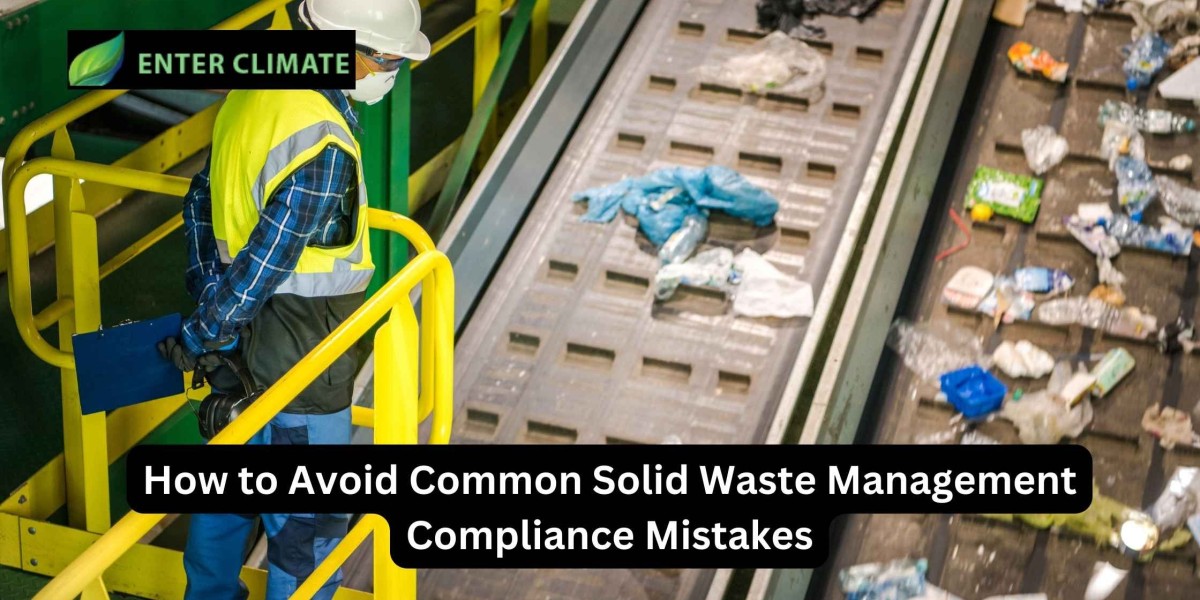Solid waste management is a critical aspect of running any business today. As environmental concerns rise, waste management compliance has become more regulated, and failing to comply with these laws can lead to hefty fines, damage to your brand, and even legal consequences. In this blog, we'll explore how to avoid the most common mistakes in solid waste management compliance. Whether you're just starting or managing an established business, understanding these pitfalls will help you ensure your waste management processes are both efficient and legally sound.
Why Solid Waste Management Compliance is Critical
Before diving into the mistakes to avoid, let’s briefly discuss why compliance in solid waste management matters. Proper waste management doesn’t just help protect the environment—it ensures that your business adheres to local, state, and federal regulations. Non-compliance can have far-reaching consequences such as fines, loss of permits, and a damaged reputation. For businesses that generate significant amounts of waste, ensuring compliance is a long-term investment in sustainability and corporate responsibility.
Common Solid Waste Management Compliance Mistakes to Avoid
Now, let’s take a look at the most frequent mistakes that businesses make when it comes to solid waste management compliance and how you can avoid them.
1. Failing to Stay Updated with Regulations
One of the most common mistakes businesses make is assuming that once they set up a waste management process, it’s done for good. Solid waste regulations are constantly evolving, and what was compliant yesterday may not meet today’s standards. Many businesses fail to stay updated on new or changing regulations, resulting in violations they could have avoided.
How to Avoid It:
- Set up a process for regularly reviewing local, state, and federal regulations. You can subscribe to newsletters from environmental agencies or work with a compliance consultant who can keep you informed of any changes.
- Consider hiring a compliance officer or designating a team member responsible for tracking and implementing regulatory changes.
2. Improper Waste Segregation
Inadequate waste segregation is another common mistake. Many businesses fail to separate their waste properly, either due to a lack of understanding or simple oversight. Whether it's mixing recyclable materials with general waste or not separating hazardous waste, this can lead to significant compliance issues and environmental harm.
How to Avoid It:
- Educate your employees on the importance of proper waste segregation. Ensure that everyone knows which materials belong in each container and why this matters.
- Provide clear, labeled bins for different types of waste (e.g., recycling, compost, hazardous waste). This encourages correct disposal and reduces the risk of contamination.
- Regularly audit waste streams to ensure that your segregation practices are effective.
3. Neglecting to Keep Proper Records
Many businesses fail to maintain proper records of their waste disposal activities, which is a key part of compliance. Failing to document how waste is disposed of, who handles it, and where it goes can put your business at risk in case of an audit or inspection.
How to Avoid It:
- Implement a robust record-keeping system for waste management activities, including waste generation, transportation, disposal methods, and recycling efforts.
- Keep documentation for the required retention period as mandated by local regulations. This may include waste disposal receipts, contractor details, and environmental reports.
- Utilize digital systems for easier tracking and reporting. Many waste management providers offer tools to streamline record-keeping.
4. Ignoring Hazardous Waste Regulations
Handling hazardous waste improperly can lead to serious legal consequences, but many businesses still make the mistake of either not identifying hazardous materials correctly or not following the correct disposal procedures. Hazardous waste includes materials like chemicals, solvents, and certain types of batteries, which require special handling and disposal.
How to Avoid It:
- Conduct regular waste audits to identify any potentially hazardous materials that need special disposal methods.
- Train your employees on how to identify hazardous materials and the procedures for handling them safely.
- Work with a licensed hazardous waste disposal contractor to ensure compliance with regulations.
5. Not Conducting Regular Waste Audits
Waste audits are an essential part of managing compliance. Without audits, businesses may overlook inefficiencies or non-compliant practices. Regular audits help businesses track the amount of waste being generated, identify areas for improvement, and ensure compliance with all relevant regulations.
How to Avoid It:
- Schedule regular waste audits (quarterly or annually) to assess how waste is being handled, segregated, and disposed of.
- Use audits to identify opportunities for waste reduction and better practices, such as increasing recycling rates or reducing waste generation overall.
- Work with a waste management service provider that can assist in auditing your processes and provide recommendations.
6. Disregarding Employee Training
Another mistake that companies often make is assuming that their employees are knowledgeable about proper waste management practices. However, lack of training is a significant factor that leads to non-compliance. Without adequate training, employees may unknowingly contribute to waste mishandling or improper disposal.
How to Avoid It:
- Develop a comprehensive training program for all employees, covering topics like waste segregation, the importance of recycling, and handling hazardous materials.
- Offer refresher courses periodically to ensure employees stay updated on best practices and regulatory changes.
- Encourage a culture of environmental responsibility by recognizing employees who contribute to waste reduction and proper waste management.
7. Choosing Inexperienced Waste Management Providers
Choosing the wrong waste management service provider can be a costly mistake. Not all waste management companies are familiar with the nuances of environmental regulations, and working with an inexperienced provider can put your business in jeopardy.
How to Avoid It:
- Research and choose a reputable waste management provider with a proven track record of compliance. Look for certifications or memberships with relevant industry organizations, such as the National Waste & Recycling Association (NWRA).
- Verify that your provider is licensed to handle your specific type of waste, whether it's general, recyclable, or hazardous waste.
- Regularly review your service provider’s performance to ensure they’re meeting compliance standards.
8. Not Having a Waste Management Plan
A solid waste management plan is crucial for ensuring compliance. Many businesses make the mistake of not having a structured, formal plan for managing waste and waste disposal. This can lead to inefficient processes, missed regulations, and an inability to track waste disposal practices effectively.
How to Avoid It:
- Develop a comprehensive waste management plan that outlines how waste will be handled, segregated, disposed of, and documented.
- Regularly review and update the plan to reflect changes in your business or regulations.
- Ensure that the plan is accessible to all employees and integrates into your company’s overall sustainability goals.
Conclusion
Avoiding common solid waste management compliance mistakes is not just about following the rules—it's about building a sustainable and responsible business. By staying informed, segregating waste properly, keeping accurate records, and ensuring your staff is trained, you can avoid costly errors and enhance your business’s reputation. With the right practices in place, you’ll not only comply with regulations but also contribute positively to the environment and your community.
FAQs
1. What are the key regulations for solid waste management compliance?
Key regulations vary depending on the region but generally include rules related to waste segregation, hazardous waste handling, proper disposal methods, and waste tracking. It's important to consult with local and national authorities to understand specific requirements for your industry.
2. How can I train my employees on solid waste management compliance?
You can train employees through workshops, written materials, and hands-on training. It's important to emphasize the importance of waste segregation, proper disposal procedures, and how to handle hazardous waste.
3. What are the benefits of hiring a waste management service provider?
A waste management service provider can help streamline your waste handling processes, ensure compliance with regulations, and reduce the risk of fines or penalties. They can also assist with waste audits and provide recommendations for waste reduction and recycling.



